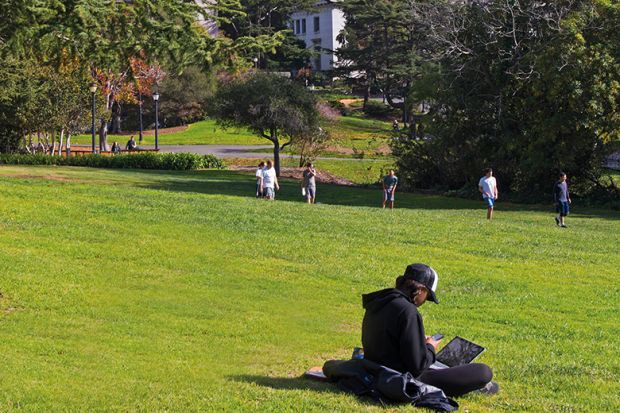The decision by the University of California, Berkeley to scrap plans to build a large new lecture theatre on campus following the pandemic-related shift to online teaching may influence other institutions to rethink traditional tuition methods, experts said.
Carol Christ, Berkeley’s chancellor, said face-to-face instruction would continue to be an important part of education at the institution but added that “there are things that are simply working better online”.
“Berkeley has lots of very big lecture courses, with more than 1,000 students. Those are working better online. Flipping the classroom, creating breakout experiences for students, is working better online,” she said during a debate last month on universities in a post-Covid world, organised by the Central European University.
Professor Christ added that the shift towards a more blended approach to learning would also enable the institution to expand its student body “because we don’t have to make a space physically for all students”.
“We’re already designing buildings differently. We are building a big data science building, which was going to have a huge, gargantuan lecture hall in it. We’ve scrapped those plans because we really do think those big, in-person lectures are going to be a thing of the past, and we’re also going to be able to extend our resources to many more students and also the public itself,” she said.
THE Campus: The active lecture provides student-centred learning for the future
Many institutions have suggested that they will permanently change their approaches to teaching as a result of their experiences during the pandemic, with traditional lectures flagged in particular as a method of instruction that might be eliminated or substantially reformed. But Berkeley’s move is one of the first concrete signs of the trend away from lectures materialising.
Diana Laurillard, professor of learning with digital technology at the UCL Institute of Education, said that because “Berkeley is an admired institution”, its decision “will be ammunition for those people within any university discussion going on at the moment” about the future of teaching and learning.
“They will say, ‘Berkeley is doing it. It’s time we rethought as well,’” she said.
However, Professor Laurillard continued, any move to online or blended learning “should be done with really careful planning and knowledge of what it takes to do this well”.
THE Campus: The lecture is dead, long live the lecture
Bryan Alexander, a researcher specialising in the future of higher education and an adjunct professor in Georgetown University’s department of learning and design, agreed that “Berkeley could be influential, given its status”.
“Covid-19 could deal lectures a serious wound, if not a death blow. We’ve known for decades that lectures are among the worst pedagogical techniques we've ever come up with. We persist in teaching with them because lectures are familiar and very cheap to offer,” he said.
Carl Wieman, professor of physics and in the Graduate School of Education at Stanford University, said he was “guardedly optimistic” that the expanding discussions about teaching practices in higher education “will stimulate some movement to re-examine centuries-old practices in light of modern research on teaching and learning at the university level, and maybe lead to some improvements”.
Register to continue
Why register?
- Registration is free and only takes a moment
- Once registered, you can read 3 articles a month
- Sign up for our newsletter
Subscribe
Or subscribe for unlimited access to:
- Unlimited access to news, views, insights & reviews
- Digital editions
- Digital access to THE’s university and college rankings analysis
Already registered or a current subscriber? Login








